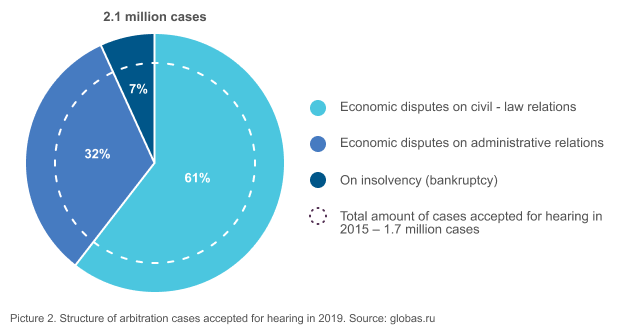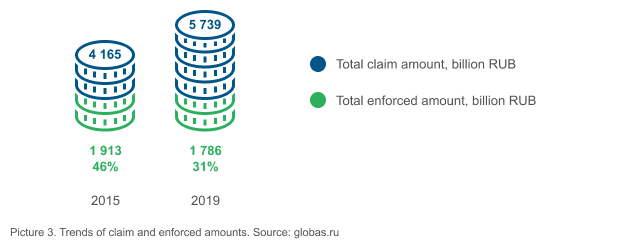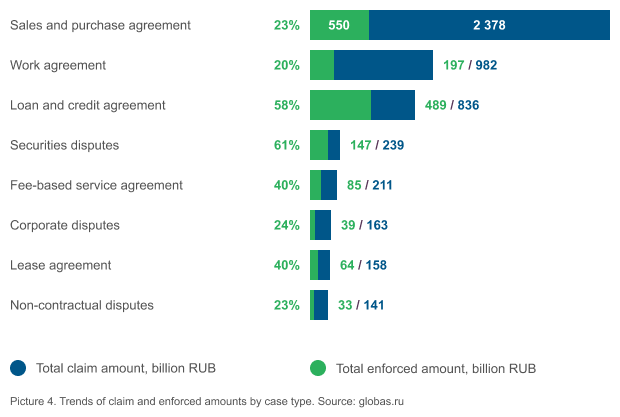A court increasingly becomes a tool for pressure
Every 10th case returns to the applicant without consideration. It means that many companies try to recover the claimed amounts through a court, and withdrawn the case as received the money.

We combined the experience of companies participated in arbitration cases over the past five years. Here are the results of our research.
Main statistics
In 2019, the arbitration courts considered a record 2,1 million cases. The number of them is growing annually, and over the past 5 years it has increased 1,3 times. Companies are increasingly turning to arbitration to resolve economic disputes with counterparties, but upholding their interests in court does not always guarantee satisfaction of claims and repayment of losses.
Most often, counterparties sue directly among themselves (61%). Economic disputes with administrative authorities account for just over a third of arbitration cases (32%). The share of bankruptcy cases is 7%.

Only one third of the amount of claims is recoverable
The total amount of claims filed by the court in 2019 amounted to 5,7 trillion RUB. Of these, the court decided to recover only 31% of the initial amount of claims, which amounted to 1,8 trillion RUB. The percentage of satisfied claims is reduced annually: 5 years ago, 46% of the claimed claims were recovered.

Non-fulfillment of the sale and purchase agreement is the most frequent dispute between counterparties in Russia
In 2019, the courts examined 514 thousand cases of non-fulfillment of sale and purchase agreements at the amount of 2,378 billion RUB. Of these, the court decided to recover less than a quarter: 550 billion RUB or 23% of the initial claims on debtors.

| The most frequently acts as defendant | The most frequently acts as claimant | |
| ОАО РЖД | PJSC Rostelecom | |
| 12 104 cases in 2019 | 11 118 cases in 2019 |
How to minimize the risks
The resolution of economic disputes in an arbitration court is a traditional and generally accepted way, but it does not always lead to a positive result, since the probability of full judicial compensation for losses is very small. The most effective way to avoid losses and minimize the likelihood of breach of contractual obligations is to carefully check and select reliable counterparties using a professional information system.
Changes in legislation
The Supreme Court of Russia made an important decision concerning protection of entrepreneurs from allegation of group crimes.
Law enforcement practice often shows examples of accusing entrepreneurs of creating a criminal community on the sole basis of their work in one company.
The Article 210 of the Criminal Code of Russia contains the following features of organization of criminal association:
- leadership of the criminal association or its constituent units;
- coordinating the actions of organized groups and creating sustainable links between them;
- development of plans and conditions to commit crimes;
- division of the spheres of criminal influence and incomes between groups.
Note to the Article adopted by the Federal law from April 1, 2020 No 73-FL states that working in one company must not classified as action in an organized criminal group.
At the same time, the Article 35 of the Criminal Code of Russia contains the provision that commission of a group crime, commission of a group crime by prior conspiracy, commission of a crime by an organized group or criminal association (criminal organization) entails more severe punishment.
In this regard, the Plenum of the Supreme Court of Russia made a special explanation about the possible guilt of economic crimes as part of a group of persons. When giving a legal assessment of such crimes, the courts should substantiate the following facts:
- whether each accomplice has intention to commit a crime as a part of a group of persons,
- whether there is a preliminary agreement between them on the joint commission of criminal acts,
- direct participation of each accomplice in the commitment of all or part of criminal acts.